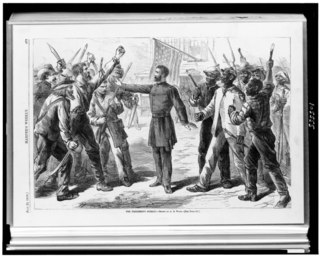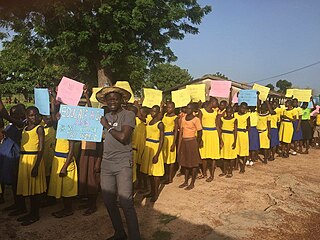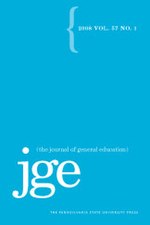
A community college is a type of educational institution. The term can have different meanings in different countries: many community colleges have an "open enrollment" for students who have graduated from high school. The term usually refers to a higher educational institution that provides workforce education and college transfer academic programs. Some institutions maintain athletic teams and dormitories similar to their university counterparts.

Education is a purposeful activity directed at achieving certain aims, such as transmitting knowledge or fostering skills and character traits. These aims may include the development of understanding, rationality, kindness, and honesty. Various researchers emphasize the role of critical thinking in order to distinguish education from indoctrination. Some theorists require that education results in an improvement of the student while others prefer a value-neutral definition of the term. In a slightly different sense, education may also refer, not to the process, but to the product of this process: the mental states and dispositions possessed by educated people. Education originated as the transmission of cultural heritage from one generation to the next. Today, educational goals increasingly encompass new ideas such as the liberation of learners, skills needed for modern society, empathy, and complex vocational skills.

The International Astronomical Union is a nongovernmental organisation with the objective of advancing astronomy in all aspects, including promoting astronomical research, outreach, education, and development through global cooperation. It was founded in 1919 and is based in Paris, France.

A polymath is an individual whose knowledge spans a substantial number of subjects, known to draw on complex bodies of knowledge to solve specific problems.

Vocational education is education that prepares people to a skilled craft as an artisan, trade as a tradesperson, or work as a technician. Vocational Education can also be seen as that type of education given to an individual to prepare that individual to be gainfully employed or self employed with requisite skill. Vocational education is known by a variety of names, depending on the country concerned, including career and technical education, or acronyms such as TVET and TAFE.
Internal medicine or general internal medicine is the medical specialty dealing with the prevention, diagnosis, and treatment of internal diseases. Doctors specializing in internal medicine are called internists, or physicians in Commonwealth nations. Internists are medical specialists that are skilled in the management of patients who have undifferentiated or multi-system disease processes. Internists care for hospitalized (inpatient) and ambulatory (outpatient) patients and may play a major role in teaching and research. Internists are qualified physicians with postgraduate training in internal medicine and should not be confused with "interns", a term for doctors in their first year of residency training.

The Bureau of Refugees, Freedmen, and Abandoned Lands, usually referred to as simply the Freedmen's Bureau, was an agency of early Reconstruction, assisting freedmen in the South. It was established on March 3, 1865, and operated briefly as a U.S. government agency, from 1865 to 1872, after the American Civil War, to direct "provisions, clothing, and fuel...for the immediate and temporary shelter and supply of destitute and suffering refugees and freedmen and their wives and children".
A Bachelor of Fine Arts (BFA) is a standard undergraduate degree for students for pursuing a professional education in the visual, fine or performing arts. It is also called Bachelor of Visual Arts (BVA) in some cases.
Special education is the practice of educating students in a way that accommodates their individual differences, disabilities, and special needs. This involves the individually planned and systematically monitored arrangement of teaching procedures, adapted equipment and materials, and accessible settings. These interventions are designed to help individuals with special needs achieve a higher level of personal self-sufficiency and success in school and in their community, which may not be available if the student were only given access to a typical classroom education.
Continuing education, also known as lifelong education or lifelong learning is an all-encompassing term within a broad list of post-secondary learning activities and programs. The term is used mainly in the United States and Canada.
Academic administration is a branch of university or college employees responsible for the maintenance and supervision of the institution and separate from the faculty or academics, although some personnel may have joint responsibilities. Some type of separate administrative structure exists at almost all academic institutions. Fewer institutions are governed by employees who are also involved in academic or scholarly work. Many senior administrators are academics who have advanced degrees and no longer teach or conduct research.
The International Standard Classification of Education (ISCED) is a statistical framework for organizing information on education maintained by the United Nations Educational, Scientific and Cultural Organization (UNESCO). It is a member of the international family of economic and social classifications of the United Nations.

Medical education is education related to the practice of being a medical practitioner, including the initial training to become a physician and additional training thereafter.

In criminal justice systems, a youth detention center, known as a juvenile detention center (JDC), juvenile detention, juvenile jail, juvenile hall, or more colloquially as juvie/juvy, also sometimes referred as observation home or remand home is a prison for people under the age of majority, to which they have been sentenced and committed for a period of time, or detained on a short-term basis while awaiting trial or placement in a long-term care program. Juveniles go through a separate court system, the juvenile court, which sentences or commits juveniles to a certain program or facility.
Peace education is the process of acquiring values, knowledge, attitudes, skills, and behaviors to live in harmony with oneself, others, and the natural environment.
Design education is the teaching of theory and application in the design of products, services and environments, and focusses on the development of both particular and general skills for designing. It is primarily orientated to preparing students for professional design practice, and based around project work and studio or atelier teaching methods.

The Higher Learning Commission (HLC) is an institutional accreditor in the United States. It has historically accredited post-secondary education institutions in the central United States: Arizona, Arkansas, Colorado, Illinois, Indiana, Iowa, Kansas, Michigan, Minnesota, Missouri, Nebraska, New Mexico, North Dakota, Ohio, Oklahoma, South Dakota, West Virginia, Wisconsin, and Wyoming. The headquarters of the organization is in Chicago, Illinois.

Inclusion in education refers to all students being able to access and gain equal opportunities to education and learning. It arose in the context of special education with an individualized education program or 504 plan, and is built on the notion that it is more effective for students with special needs to have the said mixed experience for them to be more successful in social interactions leading to further success in life. The philosophy behind the implementation of the inclusion model does not prioritize, but still provides for the utilization of special classrooms and special schools for the education of students with disabilities. Inclusive education models are brought into force by educational administrators with the intention of moving away from seclusion models of special education to the fullest extent practical, the idea being that it is to the social benefit of general education students and special education students alike, with the more able students serving as peer models and those less able serving as motivation for general education students to learn empathy.

The government of Texas operates under the Constitution of Texas and consists of a unitary democratic state government operating under a presidential system that uses the Dillon Rule, as well as governments at the county and municipal levels.

A teaching hospital is a hospital or medical centre that provides medical education and training to future and current health professionals. Teaching hospitals are almost always affiliated with one or more universities and are often co-located with medical schools.












